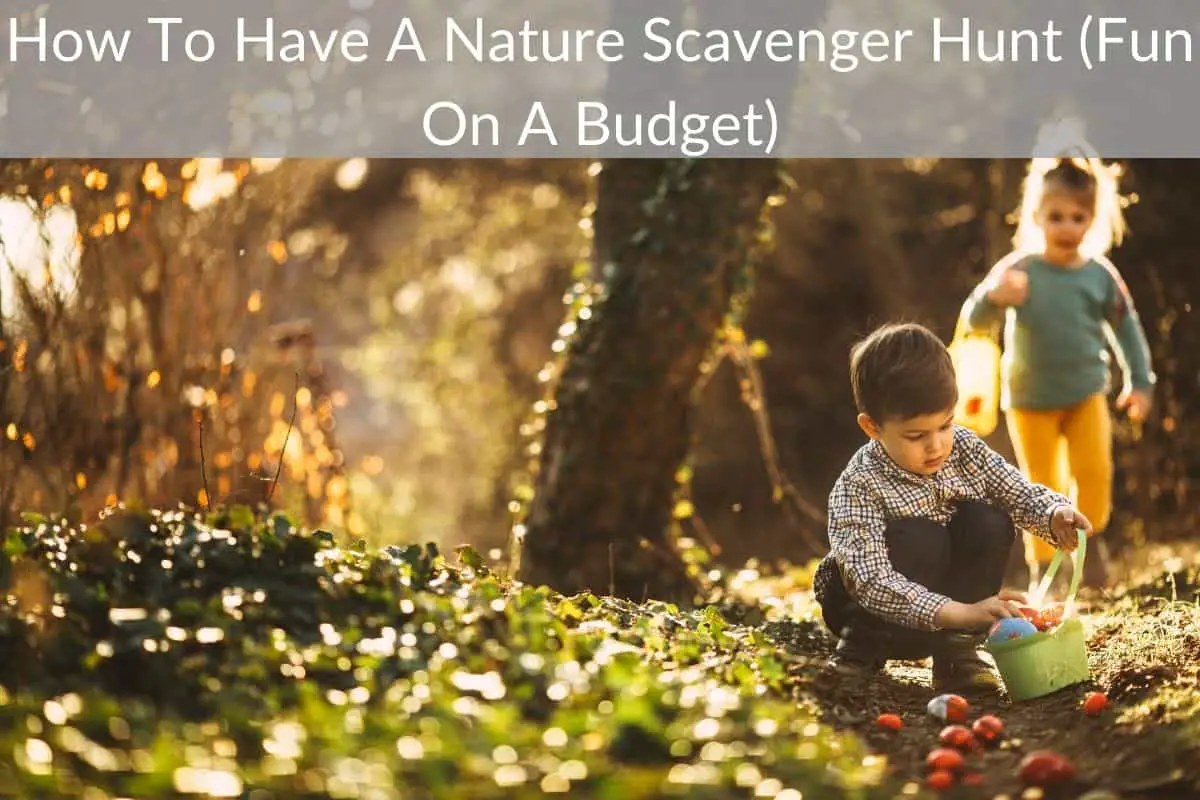*This post may contain affiliate links. As an Amazon Associate we earn from qualifying purchases.
When it comes to rocking a good scavenger hunt, the great outdoors is the perfect arena. Think about it…completely open play to roam around, endless items to hide and even more places to hide them…Using Mother Nature as your setting for an outdoor nature scavenger hunt is certain to be a good time!
The great part about nature scavenger hunts? They can be done year round as well! Some people like digging in the snow and leaves, right?
If you’ve been wanting to have a nature scavenger hunt but unsure on how to start, here are some helpful tips to get it going!
In order to have a great nature scavenger hunt, you need to start planning in advance!
Decide What Time Of The Year You Are Wanting To Host The Scavenger Hunt.
It’s possible to have it in spring, summer, fall or winter! You just have to be the one to decide what type of weather you want. Do you want to have people look for items in the snow? In the leaves? Or possibly even trekking through the muddy rainwater of the Spring? All are options, depending on how you envision your nature scavenger hunt!
Pick And Choose What Items You Are Going To Have Others Try To Find.
Having a nature scavenger hunt opens the door to so many possibilities! Think outside the box when trying to think of fun things to do and hide! The cool thing about having a scavenger hunt outdoors is that you can tailor it towards children or adults! What adult wouldn’t love to take part in a scavenger hunt?!
Items for kids to have them find could include:
- rock with a fossil
- red leaves, green leaves, gold leaves
- 5 sticks
- acorn
And for the adults? It needs to be a little bit more tricky! Adult items could include:
- black rock
- feather
- four leaf clover
- purple flower
Of course, all of these will be dependent on the weather and the season, but you get the idea!
Don’t Forget About The Final Prize For The Winner Of The Outdoor Scavenger Hunt!
EVERYONE is competing for the final prize when it comes to a scavenger hunt. So…that means that the responsibility of finding something awesome to share with others comes down on you! For kids, it can be a little more simple. And keep in mind that you don’t need to break the bank! There are a ton of affordable options that all kids would love! Think slime, crafts, coloring books, candy, and sweets…the options are really and truly endless. (Plus, most of these great prizes for kids can be found right at The Dollar Store as well!)
When it comes to giving the adults a prize, it can get a bit more interesting. Some adults will be happy with little gifts that don’t really mean anything, and that’s great! But, if you are wanting to go above and beyond for the older participants, have fun with it! A bottle of wine is always a great choice, as is any type of gift card. You can even take it up a notch and have the prize hidden somewhere outside as well and make it truly competitive to see who can find it first!
Have fun planning your outdoor scavenger hunt! Being outside in nature is always a great time, but when you add a bit of friendly competition to it, it takes it entirely over the top. And remember…the more that play, the merrier! The point of a scavenger hunt in the great outdoors is to have FUN!
If you’re looking to create an unforgettable outdoor experience for your children (or grandchildren), consider putting together a scavenger hunt in the great outdoors. Scavenger hunts are fun, challenging games that encourage exploration and teamwork — while also teaching valuable lessons about nature.
But now, let’s talk logistics…
How Can I Plan My Own Scavenger Hunt?
There is no way to tell exactly where your group will end up when they gather at your home, so there are several important questions to ask yourself before heading out into the wilds:
- Where is everyone located right now?
- Is anyone missing from your group?
- When does our event start/end?
- Will weather conditions change throughout our excursion?
- If so, how much notice do we need to give others if we don’t know exact meeting times?
All these questions help you set realistic goals for the day.
One thing to keep in mind is that most kids won’t enjoy spending hours searching through underbrush and trees. So, try to include plenty of activities that make use of any nearby space such as picnic tables, playground equipment, open fields or hiking trails. Also, remember that kids may not care as much about being able to show off all of their finds to other guests later.
Instead, focus more on making sure everyone has something interesting to bring back to share with family members and friends.
A few simple rules might work wonders here. First, never leave anything behind without checking its location carefully beforehand. Second, try to choose objects that require little effort or concentration to locate. For example, instead of picking a prize that requires someone to dig deep, pick one that only needs to be looked at closely.
These easy-to-find prizes allow even the youngest participants to feel like winners. Finally, think about adding different types of rewards for each team member, too. Some options could include small toys, trinkets, stickers, etc., but always check with parents ahead of time to avoid accidentally including potentially inappropriate gifts.
A word to the wise: It’s best to select scavenger hunt items that don’t require sharp tools, since young children shouldn’t handle those.
Where Do I Find Scavenger Hunt Ideas?
Now that you’ve got the basics down pat, it’s time to brainstorm some cool ideas. The internet provides endless possibilities for scavenger hunt inspiration, but don’t forget your local library and newspaper classified ads. There are tons of stories about old-fashioned treasure hunting adventures — just search “treasure hunt” online and see what comes up.
Another idea is to visit places that are known for having unique treasures hidden around town. You’ll probably also discover similar scavenger hunts already in place elsewhere. Take pictures of your findings to help jog your memory.
Another option is to hold a contest among neighbors or classmates by sending invitations via email or mail. This type of scavenger hunt works well because it doesn’t require planning beyond creating the list of tasks. Plus, it encourages families to come together to celebrate summertime togetherness.
Finally, spend some quality time with your kids talking about why certain locations seem to attract treasure hunters over and over again. Maybe it’s simply due to proximity or natural features. Ask them to jot down clues related to their favorite spots and then send them away with maps and lists of potential item choices. Then, wait excitedly to see what kinds of discoveries they return with next week!
3 Popular Scavenger Hunt Themes
Here are three popular scavenger hunt themes to get started with:
Animal Theme
Search for specific animals near your house, yard or neighborhood using clues found in books, magazines and newspapers. Make animal noises during searches to add extra entertainment value.
Cityscape Theme
Hunt for various landmarks within walking distance of your home. Clues usually appear in travel brochures, billboards, signs and advertisements.
Nature Theme
Look for plants, insects and birds along roadsides, beaches or parks. Find clues in books, posters, pamphlets and flyers.
After selecting your scavenger quest, decide who gets involved, how many people you want to invite and how long you wish to stay at each spot. Be creative with these details and ask your child to draw up detailed instructions showing directions between points. Encourage him or her to write notes suggesting ways to earn bonus points.
In addition, provide a map showing approximate distances between stops. That way, participants can better estimate overall mileage and speed. Most importantly, communicate clearly with others regarding starting and ending times.
Also, remember to prepare written descriptions of everything you expect to encounter. Otherwise, you may discourage people from joining or lead them astray if they miss key elements.
Things You Will Need For A Scavenger Hunt
Scavengers need lots of supplies. Which ones are must-haves, which aren’t? How many people should you invite on this adventure?
The number of scavengers invited depends largely upon your budget and availability of resources. But generally speaking, experts recommend limiting the size of most groups to six to 10 players per age range. However, if you’d prefer to host larger parties, that’s fine, too.
Just ensure that every participant understands clear expectations ahead of time.
You’ll likely need enough water bottles, snacks and sunscreen lotion for everyone. Other necessities could include:
- Paper towels
- Garbage bags
- Pencils or pens
- Duct tape
- Markers
- Trash cans
- Magnifying glasses
- Cameras
- Binoculars
- Bug spray/insect repellent
- Hats
- Sunglasses
- Flashlights
- Blankets and jackets for chilly nights.
Of course, you’ll also need transportation to get to some destinations. Many folks opt to park cars close to scavenging areas to minimize driving time. Or, maybe you can rent bikes, scooters, ATVs or boats.
Lastly, once you’ve determined your scavenger game plan, assign roles to participants based on skills and abilities. Try dividing teams into categories like hikers, searchers, collectors and drivers. Also, divide smaller jobs amongst teammates.
For instance, one person could carry heavy stuff while another carries light things. Lastly, establish an emergency signal system to alert others of problems. One suggestion is to post a note indicating that cell phones are allowed, but nobody takes them inside.
Once everyone arrives safely at their final destination, award prizes according to performance.
Once we’ve planned our mission, it’s time to get ready for the scavenger battle! Who will take what items with him or her? And how long should each person have to complete his or her task?
It’s helpful to break scavenger hunt duties into sections and assign each player a job related to that area. Before leaving, remind everyone of safety guidelines such as staying hydrated, wearing appropriate clothing, and being aware of their surroundings.
When choosing scavenger hunt items, keep in mind that younger children tend to love finding shiny coins and buttons. Older kids may gravitate toward less flashy prizes, however. Consider giving older kids bigger prizes than younger siblings. They’ll appreciate the gesture and may become motivated to perform better.
Younger kids may have trouble focusing on the big picture and completing large projects. To combat boredom, offer incentives like ice cream after finishing scavenger quests.
As far as length goes, longer missions typically yield higher success rates. But the amount of time spent actually hunting for items varies greatly.
Generally, beginners should stick to shorter scavenges lasting 20 minutes or fewer. Longer scavenges often confuse newcomers and increase the risk of injury. On the contrary, experienced explorers may elect to participate in more complex scavenges lasting two to four hours.
Still, don’t underestimate the importance of basic training! Teach newbies how to properly identify items, mark locations accurately and remain safe in unfamiliar territory.
Remember, patience is essential when exploring the wilderness. No matter how eager everyone else is to finish quickly, slow down and savor nature. After all, it’s supposed to be enjoyable!
Keep in mind, though, that scavenger hunts aren’t meant to test skill sets. Participants should still exercise caution, pay attention to their surroundings and listen for sirens, horns or warning whistles. As long as everyone stays aware of their environment, no harm will ever occur.

